do









































This month Inklings looked into students’ usage of VPNs to bypass new Staples internet restrictions
Inklings News is uncensored, unedited by administration, and does not allow for prior review.
Opinions
The Editorial Board determines editorial opinions that are authored by the Editors-in-Chief. Inklings News serves as an open forum for the public and welcomes letters to the editor and other submissions. Send signed letters to inklingsnews@westportps.org. Submissions will not be edited prior to publication.
Inklings News reserves the right to not publish advertisements that promote products that could be harmful to student health.
Inklings News is a member of the Columbia Scholastic Press Association and the National Scholastic Press Association and supports the Student Press Law Center.
The decisions of Inklings News and Westport Public Schools are made without regard to race, color, age, sex,religion, national origin, sexual orientation, marital status, disability or any other discriminating basis prohibited by local, state or federal law
2

3 | Editorial Students reflect on issues with summer assignments
7 | Phone funeral
Will Enquist memorializes his beloved cell phone
8 | Old mill
Inside the fight over a Westport community staple
9 | A tale of two teachers
Olivia Saw laments differences between teachers
12-13| China Trip
Mandarin students’ journey through millennia of history
16 | New student rep
Anwara Olasewere is the new student rep for the BOE
Students share their perspective on the shooting of conservative speaker Charlie Kirk.
The celebrity collaboration that kept a farm in business
Creative Directors
14
Andi Jacobs, Sophie Smith
Managing Editor
Will Enquist
Associate Managing Editor(s) Anna Petrosino
Camille Blundell & Bianca Mastocciolo
Business Manager
Olivia Saw Advisors
Joseph DelGobbo & Mary Elizabeth Fulco
17 | Massi Co. Westport’s new Italian restaurant
18 | Updated field house
Preview rennovations to the field house
19 | Crossword
Test your Staples football knowledge
Investigating students’ usage of VPNs to circumvent new internet restrictions.
Learn about the Staples teachers distinguished in their fields
Editors Lily Ashford
Katie Brill
Sutton Bulkeley
Anne Marie Marcaro
Chloe Mitchell
Ella Turner
Juliet Varsov
The Editorial Board voted unanimously in favor of this opinion.
June, July, August: these months consist of warmth, relaxation, rest and pure bliss for students in need of a break. However, this time is also spent participating in part-time jobs, volunteer work, pre-college programs, club sports and lastly, completing summer assignments.
Summer work is necessary in order to keep student minds sharp. However, the work is only successful in that purpose if the assignment is clearly communicated, relevant and actually reviewed or tested in class.
Summer assignments need an overhaul, as many assign ments lack accountability and relevance, ultimately causing confusion and frustration rath er than academic success.
Clear Expectations
There is typically little com munication at the end of the year to remind students about summer work. Students must check the Staples website to find what assignments, if any, they have to complete.
When summer work isn’t discussed in June, ex pectations become un clear. Many students in Pre-Calculus Honors were unaware that they had a summer assign ment because it is unusu
al that honors classes require summer work. Some students heard about the assignment from peers, while others were unaware of it until the first day of class.
Furthermore, many assignments have unclear directions, leaving students with questions about what is required of them. Without knowing who their teacher will be, students have no way to ask clarifying questions.
The majority of summer assignments are ignored in class and disconnected from the
students were instructed to read “Where You Go is Not Who You’ll Be,” a book few classes actually review. Students are left feeling frustrated and lose trust in their teacher when they spend hours on an assignment that goes unnoticed.
To ensure that students’ efforts are worthwhile, summer work should be assigned with a specific goal and students should be held accountable for their work. Currently, some students feel unmotivated to complete an assignment when there is no accountability. Accountability not only offers a
sive curriculum.
Students are willing to put significant work in during the summer to review for a high-level course, but if the assignment has little meaning, it creates unfairness and a lack of transparency that sparks confusion rather than stimulates academic growth.


Ella Turner ʼ28 Paper Editor
Many Staples students have encountered National History Day at some point in their Westport schooling career. Whether that was in 7th grade social studies or in 10th grade U.S. History honors, the program is a longstanding part of the district's curriculum. However, in May of last year, over a thousand grants from the National Endowment of Humanities were cut, and one of these cuts centered around National History Day (NHD).
National History Day is an organization that holds local, state and national competitions centered around project based history assignments. Each year they create a prompt. Students participate by researching a historical topic fitting to this theme that they are passionate about. They then turn their research into a project, with some kids creating documentaries, others creating websites and exhibits, and even some putting on a play. They then compete in their area's local NHD competition, and if they continue to place, they can advance all the way to the national competition hosted in Maryland.
Executive Director of NHD, Cathy Goron, explained
that $825,000 that the organization expected to receive was cut due to the termination of these grants by the Department of Government Efficiency (DOGE). Despite these cuts occurring near the start of NHD’s events last year, through donations and other funding, they were able to muster up the amount needed to host the competitions. There have been tremendous efforts to raise money and continue the competition, although the future of this organization is still uncertain.
“NEH funds humanities counsels in states and territories,” the state coordinator for Connecticut History Day, Rebeccca Taber-Conover said, “so some of our affiliate programs for National History Day,[...] are actually run by their actual state humanities organizations, so that’s where the impact has really hit.”
As for Connecticut, there are no tremendous changes or losses in funding, due to the fact that Connecticut History Day is, instead, run from the Connecticut Democracy Center.
“We are just getting ready to do our annual appeal in terms of donations, and then we do raise some funds through selling items and registration fees,” Taber-Conover said. “We're very committed, and we are moving forward

Photos contributed by 06880, Sadie Sherman ʼ27, Zara Saliba ʼ26
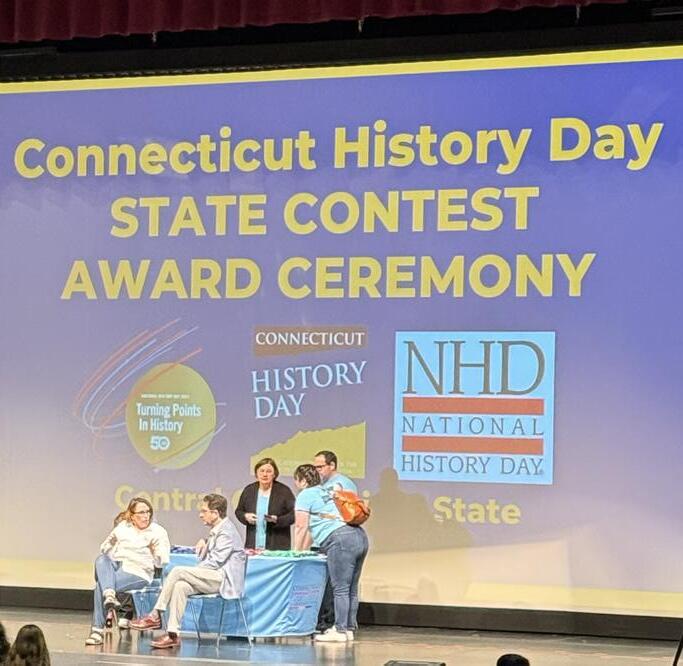
RESEARCH TEAM Sadie Sherman, Lily Ashford, Chloe Beitel and Audrey Ziegler ’27 focused their National History Day project on exploring the Menendez brothers case.
HISTORY HIGHLIGHTS National History Day is included in Westport’s curriculum for both seventh-grade social studies and tenth-grade U.S. History Honors.
with Connecticut History Day.”
While local and state competitions are set to move forward as usual for now, the national competition in Maryland has caused a bit more concern. Taber-Conover has been in contact with the people in charge at the national level, and at the moment there are no blaring signs that National History Day might not be able to run this year.
“I don’t think anyone should be worried that National History Day is going away,” Taber-Conover said.
When it comes to the level of risk in the program that could arise in the future due to these funding cuts, discussions in Westport have already occurred about the following steps.
“If for whatever reason on a national level, the program was canceled or it didn't run anymore, we would still use the resources we have and do a very similar type of research experience for our students,”
Social Studies Coordinator Lauren Francese said. “So it wouldn't result in us changing the curriculum, it would be a change in that we wouldn't have a program for students to go out into the world and compete in.”
Despite the variety of motives for these funding cuts, Teachers and students alike find great value in the project, reaching far deeper than the prompt itself.
“I think they learn research skills…time management…I think also just hopefully a love for history,” US History Honors teacher Nell-Ayn Lynch said.
Nate Gerber ʼ27 Paper Editor
Debate serves as civilization’s alternative to violence. From ancient Rome to our founding fathers, to today, the basis for Western society lies in civil discourse.
Yet today, this principle has been inverted—debate is often the precursor to violence. The killing of Charlie Kirk at a campus debate event makes it brutally clear: it doesn’t matter which side pulls the trigger; when dogma is put before civility, we don’t just argue—we return to savagery. And in this regression to tribalism, traditional Left/Right distinctions become meaningless.
shouts. And once dogma replaces dialogue, words cease to be tools of persuasion and become instruments of violence. Words become weapons.
look beyond their inner circle (whether that be on social media, at school or at home) and, like the great Roman Cicero before us, learn to see all sides.
Charlie Kirk’s death isn’t just a national tragedy; it’s a warning of where our own tribal tendencies can lead.
While this might seem far from Staples, this phenomenon doesn’t just grip Washington or college campuses. It lives here, in Westport, too. When our attitude towards everything is ‘friend versus enemy’, we lose the ability to recognize that different points of view make society whole. When we believe that our own perspective is infallible, that’s when civility is lost and our humanity is taken away.
After all, the struggle between critical reasoning and dogmatic belief is a tale as old as time. The question is whether Charlie Kirk’s killing marks the moment when we choose to write a different ending.
This shift from critical reasoning to dogmatic belief has turned college campuses, in theory the home for intellectual freedom, into hostile ground. It transforms speech from a tool of understanding into a weapon of allegiance. Unlike legitimate advocacy, which seeks to persuade through evidence and reasoning, dogma is about loyalty to a predetermined outcome. Therefore, its devotees maintain their conviction even when the facts change.
In a polarized society, both Left and Right reach for blind allegiance to their cause. They don’t listen to understand; they seek to respond with louder
Charlie Kirk’s death isn’t just a national tragedy; it’s a warning of where our own tribal tendencies can lead.
Because the truth is this: whatever a person thought of Kirk’s ideas, he was killed due to his will to share his perspective in public debates. His assassination wasn’t inevitable; it was a result of a culture where dogmatic thinking has made opposing viewpoints seem like existential threats.
This doesn’t mean we should agree on everything— that’s neither realistic nor necessary. Rather, this tragedy is a strong signal for everyone to



Alexis Jacobs ʼ26
Web Managing Editor
Alex Gordonos ʼ27
Staff Writer
Heading into the 2025 school year, Staples High School cracked down on distractions by blocking social media and popular apps on its Wi-Fi. And of course, students found a loophole. They quickly discovered that a simple VPN (Virtual Private Network) download could slip past the firewall, allowing them to access all restricted apps.
A VPN reroutes your internet, connecting to servers in other locations. Therefore, a student can get a connection to any blocked platforms without using the Staples BYOD wifi. Breaking the restrictions is as simple as downloading a VPN and accepting its terms and conditions to allow the foreign connection.
“I downloaded VPN-fast VPN SuperIt’s,” *Jane ’26 said. “It’s nice because I am able to check social media and other apps during free periods and in the hallway during passing time.”
Staples students who can’t, or don’t want to,
does not have a VPN and finds it frustrating getting notifications that his friends with VPNs are chatting with him on Snapchat, but he can’t open them.

“
students caught using VPNs... could face a one to 10 day...suspension
- Natalie Carrignan WPS Director of Technology
“I didn’t really have a need for [a VPN],” Sareen said. “It was never necessary for me to use [social media in school], but it’s just kinda annoying.”
Some students justify using VPNs because they consider the school’s wifi limitations to be unnecessary and over restrictive. For example, *Jane explained how it’s nice to be able to communicate with her friends through Snapchat when trying to find them in the cafeteria at lunch.
That said, VPN usage comes with risks. Accord-

slower, but it can cause your phone to be more vulnerable to viruses and other security risks. The connection used with a VPN is not considered a secure network, and information is more susceptible to being tampered with. VPNs also get your connection from foreign places.
“Some malicious VPN apps have been found to sell user data. instead of protecting you, the VPN could become a tool for surveillance,” WPS Director of Technology Natalie Carrignan said. “Fake or unverified VPN apps can contain malware, spyware, or adware that runs in the background.”
The threat is real, as some students can attest.
“I downloaded a VPN and it gave me some sort of virus,” *Jake ’26 said. “It would skip Spotify songs without me controlling it, which really scared me.”
Ultimately, the school administration has warned that use of VPNs violates the school’s acceptable use policy. As per the student code of conduct, students caught using VPNs to bypass school security could face a one to 10 day in-school or out-ofschool suspension.
“There will always be students who do not follow






Will Enquist ʼ26 Managing Editor
we gather here today in the halls of Staples High School to mourn the tragic passing of a faithful companion, friend and loyal servant: the cell phone.
It did not shatter on the asphalt during the 26.2 mile walk to Wakeman, nor did it run out of battery while the charging station in the library was full. Rather, the administration has cruelly decreed that our phones are to be relegated to the cold, dark jail cells we know as the school’s lockers.
This needy, gossip-loving and sleep-depriving distrac tion was taken from us in the prime of its ever declin ing battery life. No longer will we feel the sense of an ticipation brought on by the errant buzz of a text message in the middle of class; no longer will we be greeted by a plethora of notifications
at the end of a period. We are left alone, to go forth and navigate our school life, talking to peers face-to-face (-GASP!-) without that comforting six ounce weight in our pocket.
Gone are the days of spending an entire free pe riod scrolling on Tiktok or Instagram Reels. Gone are the days of listening to the newest Drake album in the morning hours of an over cast Friday in the fall. Oh, the horror.
While we may all mourn







Andi Jacobs ’26 Editor-in-Chief
Sophie Smith ’26 Editor-in-Chief
For over 100 years, the store at Old Mill Grocery and Deli has had many different names. According to the Soundview Empower Alliance (SEA), the Old Mill store is the oldest continuously operating retail establishment in Westport. But now, lawsuits could threaten their business.
In the winter of 2021, Elvira’s Market, which previously occupied the Old Mill property, was for sale, and community members Jim Hood, Ian Warburg and Chris Tait joined together with the goal of purchasing the property to prevent its conversion into a private residence. They formed SEA and raised enough money to purchase the property. Once the purchase was successful, SEA hired Romanacci’s to operate the deli for them.
Hood emphasized the role of local residents in funding the purchase, crediting the community with keeping the store in operation.
“A lot of people say that we saved it, but the real truth is, the commu nity saved it,” Hood said.
“The community loved the place and the people in the communi ty were willing to put up $1.3 million to
save their little neighborhood gathering place.”
However, three lawsuits from a group of neighbors could potentially lead to the store’s closure.
The neighbor’s complaints cite concerns that the gelato cart and picnic tables could draw larger crowds, which some neighbors say would be disruptive to the neighborhood.
Their most pressing concern, however, is over the potential effect that Old Mill’s provisional beer and wine license might have on the neighborhood. They have named possible negative outcomes such as traffic jams, parking on the sidewalks, underaged drinking, people remaining in the area at late hours and people buying alcohol to use on the beach.
These complaints started a year ago, but they have intensified in recent months. Inklings reached out to the plaintiffs for details on these grievances but received no response.
Hood acknowledged the concerns but said none of the predicted problems have occurred during
nearly a year of beer and wine sales.
“Objectively, if any of those things had happened, it would not be good, and I would say a reasonable person would say ‘Yeah, I agree [with the concerns],’ but none of those things have happened and we’ve been selling beer and wine for almost a year,” Hood said.
According to Westport Police, no incidents related to beer and wine sales have been reported. In addition, the P&Z granted a text amendment making the sales legally permissible.
“It is the charge of the P&Z to decide what is best for the community in regard to planning and zoning in Westport,” P&Z director Michelle Perille said. “I believe they support the current operation by adopting text amendments that aid in the economic viability of [Old Mill Grocery].”
This summer, SEA launched a public relations campaign and a petition. After unsuccessfully trying to resolve the conflict with neighbors through legal defense, and re-

decided it was time to inform the broader community and rally support.
SEA displayed a sign on the deli that read “Don’t Kill the Old Mill!” and distributed flyers throughout town. Soon after, they created a petition— which drew 3,800 signatures in just three days—and a GoFundMe page. Their campaign centered on four main calls to action: sign and share the petition, contribute to legal expenses and contact members of the Representative Town Meeting. So far, SEA has spent approximately $50,000 in initiatives to resolve these complaints. They are determined to keep the Old Mill Deli alive, but they worry that they will run out of funds.

“It’s a labor of love to preserve a historic property,” First Selectwoman Jen Tooker said, according to SEA’s website, “and to ensure that future generations get to learn about and experience our community’s history, while also benefiting from [SEA’s] expanded mission.”


Olivia Saw ʼ26
Business Director

There’s many injustices in life: when your AirPods die right as you get to the good part of a song, or your message autocorrects to something criminally embarrassing, or worst of all, when you sit next to a crying baby on a 17-hour flight. But I believe that the greatest, most diabolical injustice is drawing the teacher short straw (the harder teacher) when other students bask in the glow of their worksheet-free savior.
It’s like going to a restaurant with your friends and everyone orders the same dish; except yours arrives soggy, undercooked and simultaneously burnt, while everyone else is raving about how theirs is perfectly seasoned. They got the good chef. You got the one who forgot that salt exists.
The tragedy can play out in any subject. In English, your friends get the teach er who plays film adapta tions while they take notes and have an ungraded discussion about the symbolism within the movie. You get the teacher who thinks 30 pages of reading
is light work and grades essays with comments of “?” and springs an (unpleasant) surprise grade for you in PowerSchool.
In this cruel lottery, someone always draws the short straw “
- Olivia Saw
In math, their teacher gives them a study guide that is almost an exact copy of what the exam will look like, only with different numbers, and then discusses with the class what birthday present to get their 10-year-old nephew.
Meanwhile, your teacher tells you to get creative and make your own study guide, and sentences you to scrounging the World Wide Web and praying to ChatGPT for guid-

In science, they’re making diagrams of animal cells out of can-
dy, frolicking and playing Kahoots to their heart’s content. You’re spending the week listening to presentations nearly 60 slides long and dutifully copying down every bullet point as if your grade depends on your ability to transcribe the world’s driest audio book.
And then–oh, the cru elty–of asking your teach ers a question about a worksheet, only to be met with a shrug and “I ac tually don’t know, let me consult the answer key from the other teacher.”


is while upperclassmen whisper horror stories about The Difficult One. Because in this cruel lottery, someone always draws the short straw, and that straw tastes like red grading ink and

The work sheet wasn’t theirs to begin with, so suddenly it’s no longer student vs. problem; it’s you and your teacher, in mutual confusion, staring into the abyss of not know ing together.

In the end, education is not the great equalizer— it’s the great roulette wheel. Some spin lucky and walk away enlightened. Others spin unlucky and stagger out clutching a binder full of unanswered questions and coping mechanisms, an essay marked with nothing but “awk,” and the uncanny ability to survive on caffeine, tears and last-minute Google searches.


Education is often called the “great equaliz er.” Whoever coined that phrase clearly never felt the dread of waiting to learn who your teacher



Anna Petrosino ʼ26 Associate Managing Editor
Viv’s Veggies is an organic farm and market in Weston, offering fresh, locally grown produce. The owner, Vivian Simons, always loved gardening. She could spend seven hours a day working in the garden.
“I fell in love with this piece of land,” Simons said. “It was on the market 12 years ago and I ended up buying it and turned it into this organic farm.”
However, earlier this year she was reluctant to open Viv’s Veggies again.
“To be honest, I wasn’t planning on opening, ” Simons said. “I lose a lot of money from farming. It’s not profitable, [...] and it’s so much work.”
That’s when Viv received a message from one of her returning customers, Paige Lorenze. Lorenze resides in Southport, and is an influencer who posts lifestyle and fashion content for her million followers on Instagram and YouTube. This prompted her to create an up-and-coming lifestyle brand, Dairy Boy, in 2021 that sells clothing, denim, homewear and accessories. Lorenze is also engaged to American tennis pro Tommy Paul.
features

“Paige texted me, ‘Viv, I want to help you,” Simons said. “She came here, helped me clean up the farm, built custom shelves and a shed with AC to keep the vegetables fresh.”
Through this collaboration, Lorenze receives no compensation. Her only request was to have her brand, Dairy Boy, be printed across the Viv’s Veggies sign for additional exposure. Now, teen girls’ Instagram stories blow up across Fairfield County with photos of the Viv’s Veggies stand, baskets of cherry tomatoes, Dairy Boy merch and of Lorenze and the Dairy Boy ice cream truck that travels throughout Connecticut and New York for pop-ups.
She saved the farm “
- Vivian Simons
The Farmstand is a stand at Viv’s Veggies that sells produce and other micro businesses goods with picnic tables and flowers spread out. People can shop, sit and talk or walk around the farm. Lorenze occasionally visits, sometimes with the ice cream truck, and sells Dairy Boy merch as a pop-up.
“I went [to the Farmstand] because my sister was in a short clip with [Lorenze] and she has been obsessed with her for the longest time,” Daisy Hackett ’27 said. “It was her dream come true to even meet her.”
The Farmstand by Dairy Boy proved to be a success, not just by the crowds it drew in support for the life-style brand, but because it gave Simons the support she needed to keep farming.
“It’s a good deed that she did,” Simons said. “She saved the farm.”
The revival of Viv’s Veggies also created space for other local makers, including baker Inna Fiafman, who launched her sourdough microbusiness in the fall of last year. She makes sourdough out of her home with a full cottage license and makes each loaf by hand.
Fiafman met Simons last October and started selling her bread at her barn. That following spring, they were unsure of the future of Fiafman’s sourdough business.
“But a lot has changed,” Fiafman said. “Dairy Boy has helped the farm and we opened the stand. ”
Since the rescue, she’s been selling at The Farmstand, working together with Dairy Boy staff and other micro and small businesses, they have been able to sell handcreams, honey, sourdough, produce, olive oil and other micro-business products all in one stand.
“We have the best customers and the best team,” Fiafman said. “I think because it’s gaining popularity it’s attracting everyone. It’s really a happy place.”
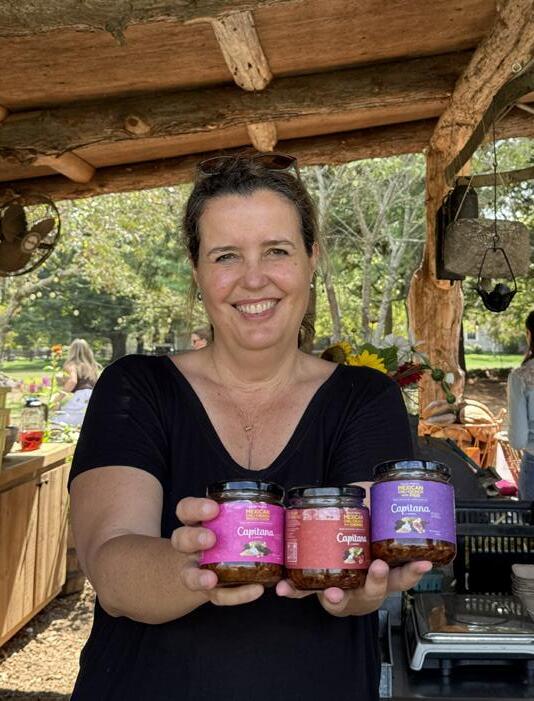


Lorenza Arnal founded Capitana, a chili crunch brand, in 2021 and sells along the East Coast, California and Texas.



Beatrice Karp founded Bea Olive Oil. Karp harvests Olives in Tuscany, Italy and ships them to the United States. She sells in N.Y.C. and ships globally.




THEFARMSTANDIt’sopenfrom12-5p.m.onWednesdays andweekends. Locatedat253LyonsPlainRoad,Weston


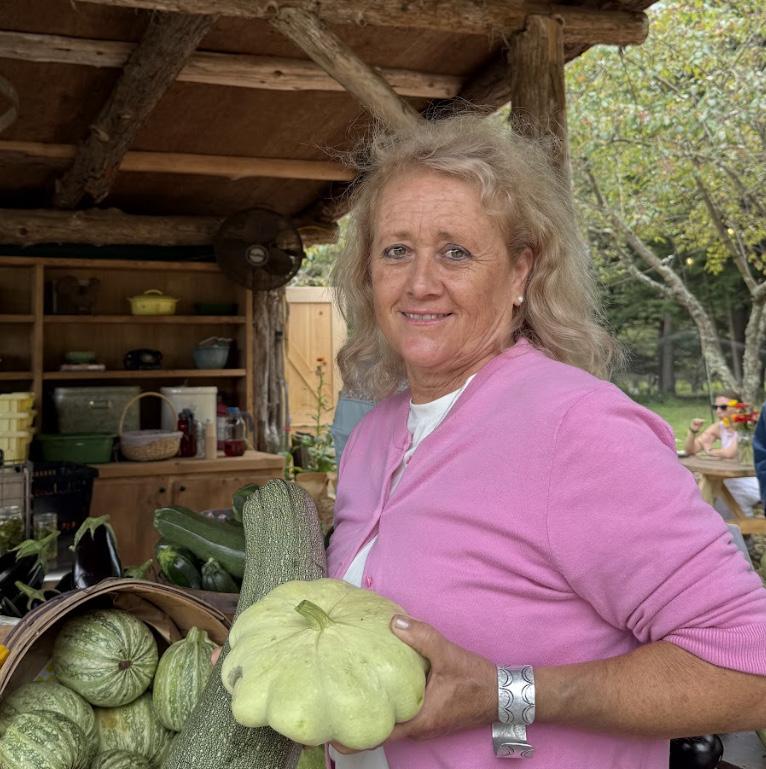
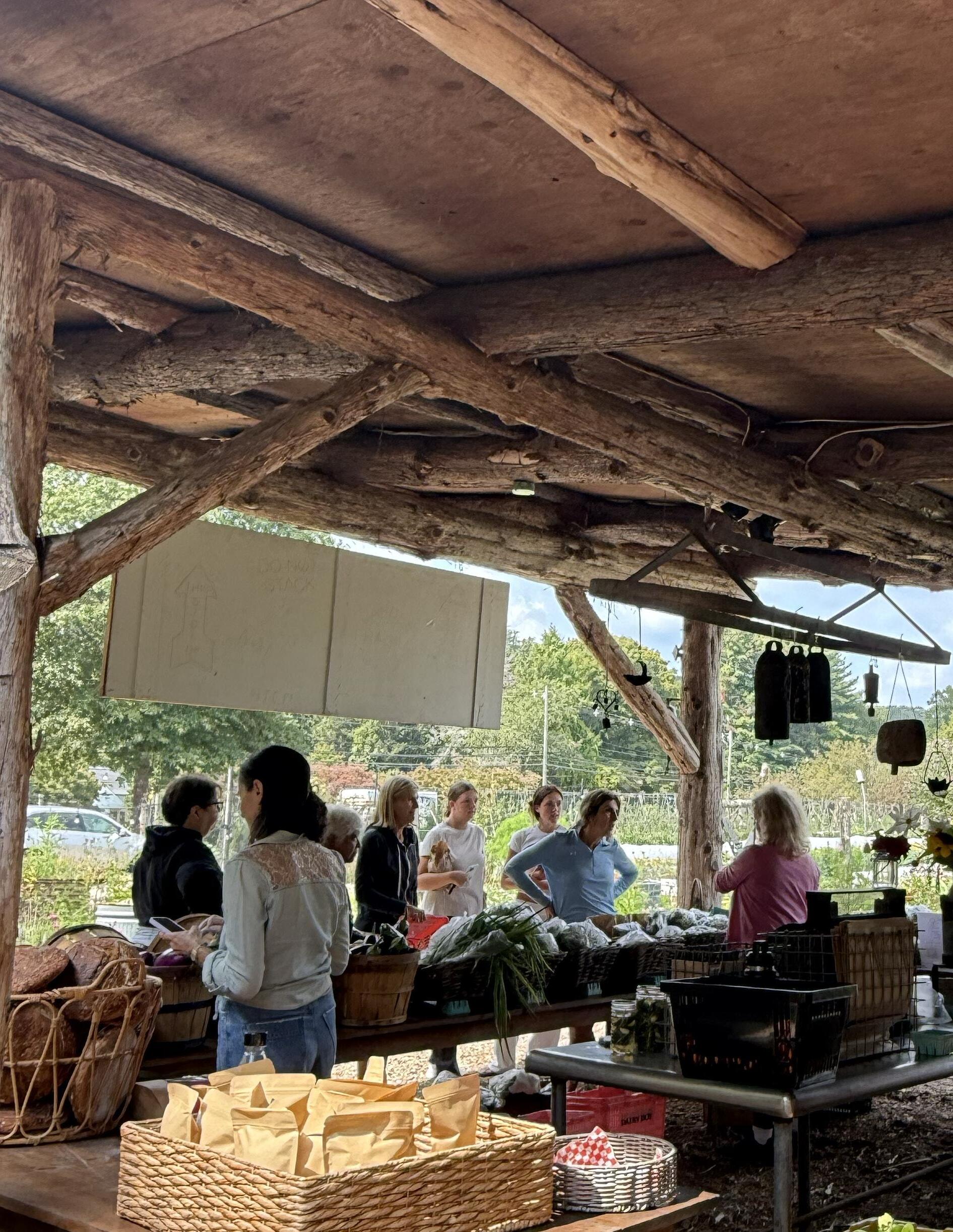

tour manager. He has led a similar program five times for
“After the first tour of Staples students that I led back in 2009,” Fray said, “I saw firsthand that my students were greatly impacted by their visit to China and that their motivation to continue studying and actually becoming pro ficient in Mandarin had in
Each stop revealed a dif ferent layer of China’s history, culture and modern identity. In Suzhou, students explored tra ditional musical instruments and learned the interplay be tween music and culture. In Shanghai, they competed in a fast-paced scavenger hunt that tested their Mandarin skills and adaptability. In
leaves on lush hillsides while learning the patience of tea cultivation, an experience that tied history, agriculture and daily life together. And in Beijing, they practiced calligraphy and painting, skills that required focus, care and appreciation for Chinese artistic traditions.
This year’s itinerary also included a first: Inner Mongolia.
:StudentsvisitedtheTerracottaArmyatEmperorQinshihuang’sMausoleumSiteinXi’an,China.

Mandarin in real-life settings. For Miles Kahn ’26, that meant being welcomed into a home shared by a boy his age, his parents and grandmother.
“They spoke Mandarin essentially the whole time,” Kahn said. “The boy knew a little bit of English, so it was a learning moment for both of us when it came to communicating.”



As students spent nearly every hour together traveling through unfamiliar cities and absorbing all the sights they had to offer, they grew closer, regardless of age.
“I definitely feel a lot closer to a lot of the people who went on the trip. There were underclassmen I had never met before that I now consider good friends,” Kahn said.
While the travelers passports mark the journey’s end, the friendships, lessons and memories will last long after the stamps.


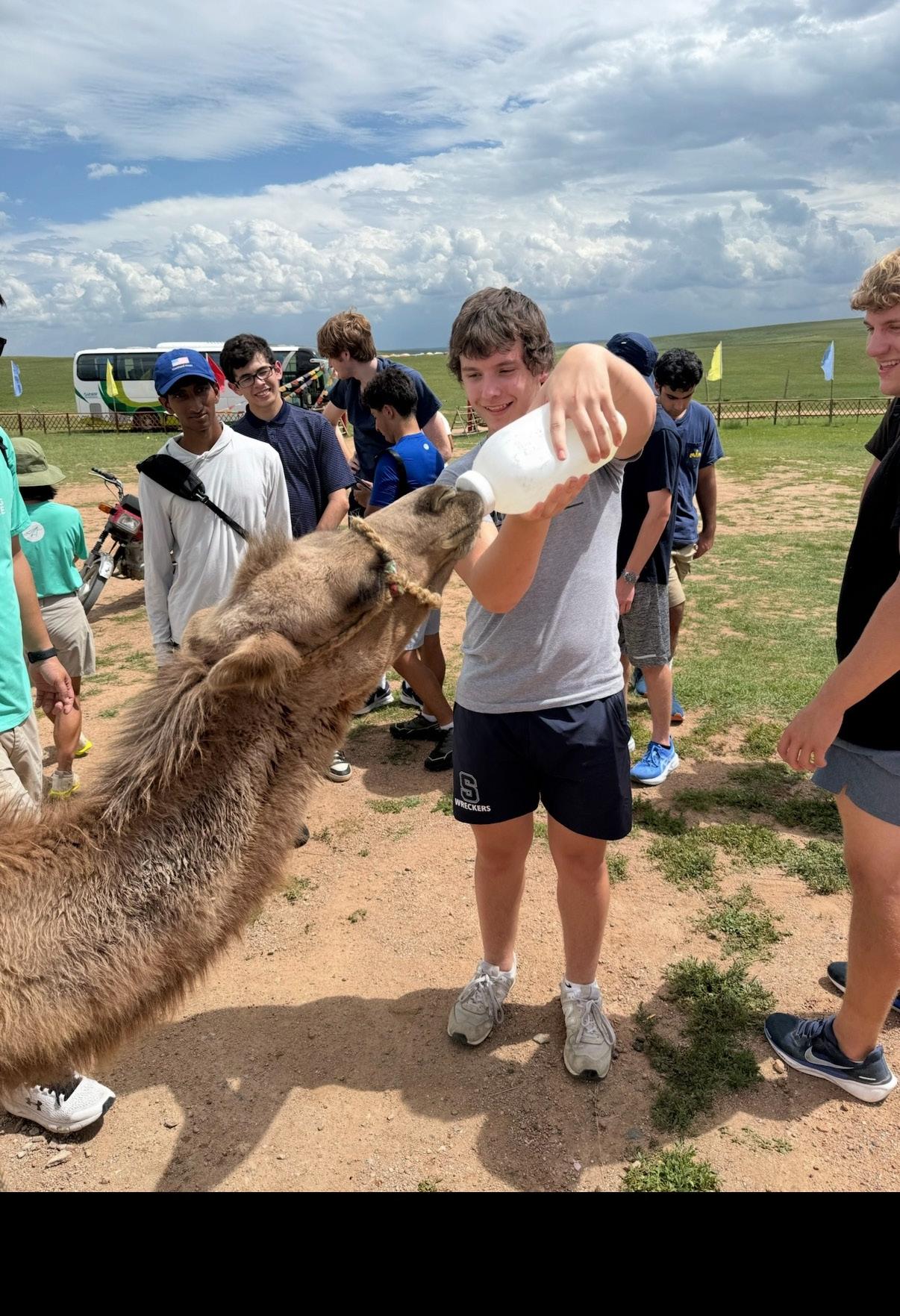

Idefinitelyfeelalotclosertoalotofthepeople whowentonthetrip.There wereunderclassmenIhad nevermetbeforethatInow considergood “



DYNAMICDUO: MandarinTeacherChrisFray(left)ledthetripwith hishusband,ChrisReed(right).Fraypreviouslyworkedasaprofessionaltourmanager.



Camille Blundell ʼ27
Bianca Mastocciolo ʼ26
Creative Director

“Those who can't do, teach.” This silly cliche is proven wrong by Staples High School and its impressive sta . The motto most teachers have instead is “Been there, done that,” as they have large amounts of experience both in their eld and teaching it to their students.
Death investigator. It’s an intense title for an intense job.
Forensics teacher David Rollison spent this past summer interning at the o ce of the chief medical examiner in Connecticut, where he worked among other interns investigating crime scenes and lling out paperwork.
“I was either in meetings discussing the cases for that day, continuing writing reports for cases previously or I got called,” Rollison said. “If a call comes in about a death and the state wants to know about it, we go.”
A presentation from a death investigator inspired Rollison to begin taking classes at one of the top forensics schools to expand


his knowledge. He’s currently working on becoming a licensed death investigator.

Rollison created the Staples forensics program 15 years ago with coworker and science teacher Michael Lazaro .


Creative Director he
With his real life experience, he wishes he could translate the emotional aspect of crime scenes into the curriculum he teaches.
















“[Forensics is] not like going to work in banking or teaching. There’s such an emotional component that you have to keep your cool,” Rollison said. “You don’t know you’re going to be ok in these situations until you go through them.”






IN ACTION Forensics teacher David Rollison practices locating and marking possible evidence with a mock crime scene. Phote contributed by David Rollison









































rt teacher Stephanie Sileo traces her love for art back to childhood, sketching cartoon characters. Now a dedicated printmaker, she nds that joy in experimenting with her processes.
“Being a printmaker, you are exposed to this big, mystical medium that encompasses many di erent types of printmaking,” Sileo said.
Recently, she’s been experimenting with Cyanotypes, a photographic printing process that creates a distinct cyan blueprint with UV light and a solution of iron salts on a piece of paper or fabric. Through this process, she found a way to fuse the physical and digital medi-
ums. To her, printmaking means playing around with di erent mediums and discovering where your work ts best.
“In grad school I was a very physical artist, and I started to scan these digital gauze pieces on a scanner and manipulate them,” Sileo said, “So now, I have this whole library of modular pieces that I build and draw with on my computer.”
Her sense of exploration translates through her teaching styles while teaching Advanced Printmaking and AP Art and Design.
“I think my memorable teaching moment is seeing the passion that I have for printmaking in kids, and them being like ‘Woah, this is so cool,’” Sileo said.
hen you think of someone with a lot of lab experience, chemistry teacher Dr. Flavio Tinoco should be the rst to come to mind. Starting chemistry in his chemistry focused high school, Tinoco graduated with an associates degree, but missed his graduation to go on an internship where he could spend more time in the lab.
“It doesn’t even feel like hands-on experience anymore,” Tinoco said. “Practicing chemistry is being in the lab.”


After going to school in Brazil, he then practiced chemistry all over the world: Switzerland,




Italy, New York and Boston. For many years, he studied speci cally how to get dye to adhere to fabrics .
“It’s interesting because we only worked on one color: blue dye,” Tinoco said.

As a teacher, he hopes for students to enjoy their time in the lab as much as he does. He wants to translate his years of experience into his teaching and bring his passion into the classroom. He believes the best way to understand the theories taught in class is to work on them in the lab.











“Chemistry is all around us,” Tinoco said. “Everything we do relates back to chemistry.”















Ann Marie Maccaro ʼ27 Paper Editor




Acation student

Every year, the Board of Education (BOE) appoints a new junior student representative to provide rsthand insight into student life, enhancing the BOE’s decision-making process and policy discussions. To join the Board, a student must submit an application and complete an interview with the current representatives, who then decide who is best for the position.



Olasewere ’27 has been appointed by e Staples High School Board Of Education (BOE) to be the new student representative on the board. She will serve through her junior and senior year
Every year, the BOE appoints a new junior student representative to provide rsthand insight into student life, enhancing the BOE’s decision-making process and policy discussions. To join the Board, a student must submit an application and complete an interview with the current representatives, who then decide who is best for the position.

“I’ve been in a few other clubs like the Westport Youth Commission and Staples Student Council, and while those clubs have done a lot for students,” Olasewere said, “I was interested in helping students at a higher level and having a more direct voice in what is affecting students.”
pressing Board matters.
“Without student reps on the Board, students just have to hope that the Board listens to them and hears what they say,” Olasewere said. “But since I can speak at the Board meetings, I can directly communicate with them and let them know what Staples students want.”

“I will make









For the next two years, the





Olasewere will draw on her work with other clubs and community events, where she plans to step into this role to make a lasting impact.







sure that their voices are heard .”
Having student representation will help to ensure that all voices, perspectives and ideas are expressed throughout the decision-making that impacts everyday student life.
spectives on Staples Board of Ed-




Her position on the BOE serves as a direct information pipeline from the students to the Board and vice versa. Being a student herself, she can apply her experiences and share student per-
“Last year with the schedule change, the two Board of Education representatives really made sure to communicate that the students did not want the new schedule,” Olasewere said. “If something like that happens, I want students to know that I’m there for them, and I will make sure that their voices are heard.”


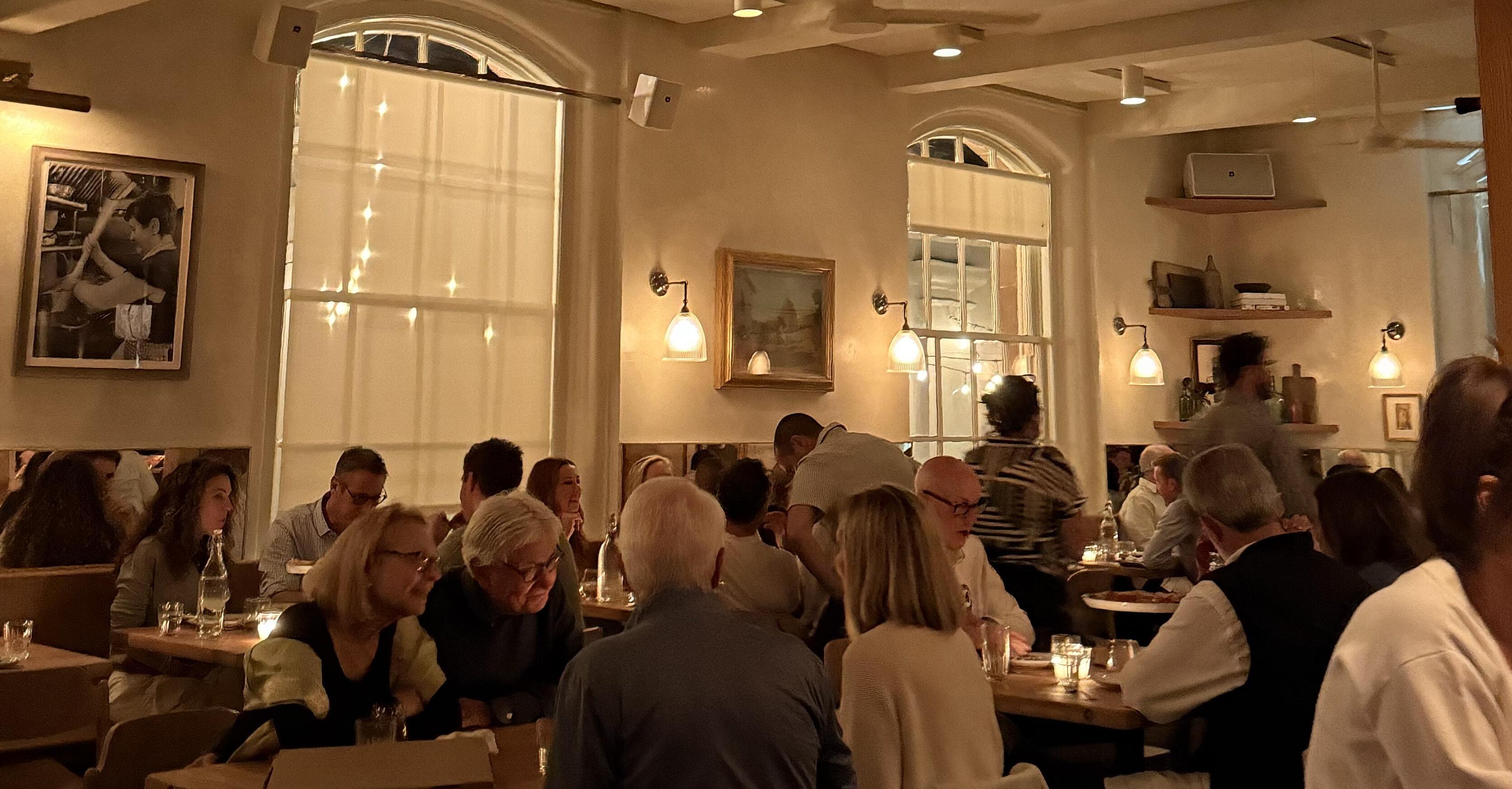






MEET THE TEAM From top to bottom General Manager Ingrid Panaroch and Owner Massimo Tillo is on the bottom.
Anna
ʼ26 Associate Managing Editor
Lily Ashford
Paper Editor
Massi Co, the newest addition to the downtown Westport dining scene, has not only brought an authentic taste of Italy through their imported ingredients, but also a comforting atmosphere that no other restaurant has encapsulated.
Owner Massimo Tillio switched his previous restaurant Don Memo, which focused on Mexican food, to Massi Co, an authentic Italian restaurant, relating more to his culture.
“The concept kind of grew from when my family were all from this area in Naples,” Tillio said. “We wanted to show people that most restaurants here are American Italian but we’re Italian Italian, mostly southern Italian.”
Tillio hopes that when people visit his restaurant, they will enjoy slowing down to savor the moment.
“All we have is time,” Tillio said. “Time to commute, time to get together, time to hangout with each other.”
Along with the cuisine, comes top notch ingredient quality. All items are imported from Italy, and the pizza is 100% sourdough.
“It’s going to be a bit richer, a bit heavier, and (something I like to say), a bit more soul to it,” Tillio said.
But food is only part of the experience. Tillio spent weeks updating the sound system so that music from vinyl records fills the room. Theme nights will eventually match music to food.
“They say the two things that can create serotonin in your body are music and pizza,” Tillio said.
Massi Co also takes pride in their restaurant atmosphere. They want this to be a place for guests to settle in, talk and ex-

perience Naples traditions.
“Restaurants are supposed to be kinds of places where you’re kind of invited into someone’s house,” General Manager Ingrid Paronich said. Paronich has worked in hospitality for decades, and she says too many restaurants now focus more on appearances than atmosphere.
“I want Massi Co to be a place that’s cool in the sense it’s different and delicious and good but also a place where when you walk through the door you know who we are we know who you are and there’s a lot of building of relationships,” Paronich said.
In a town where restaurants come and go, Massi Co is aiming to last: good food, good music and good company. “I want people to get back together,” Tillio said, “talk and listen to good music.”

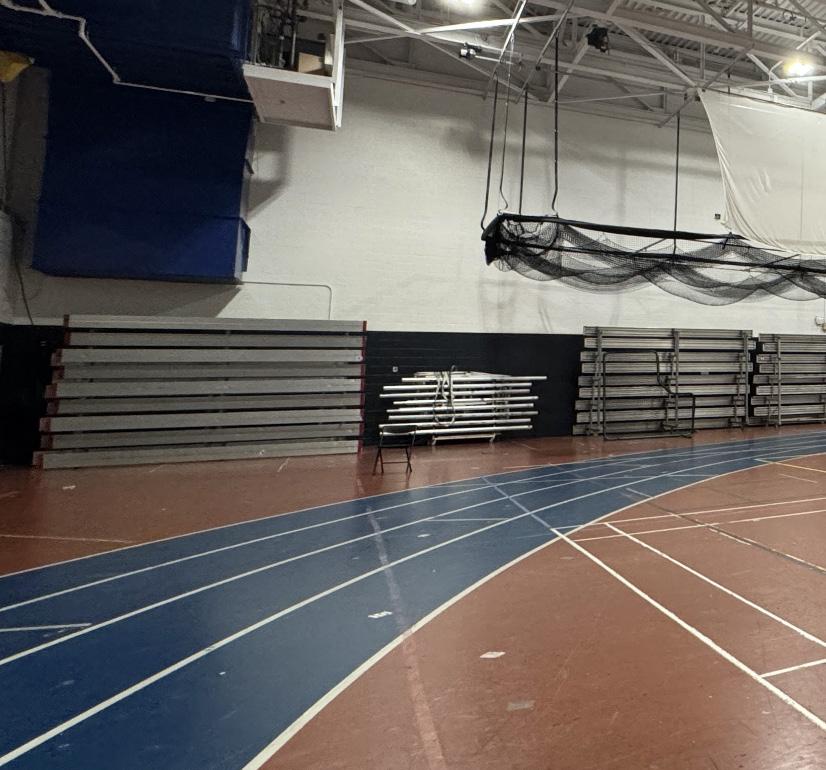

Brooke
Kirkham ʼ27 OTW Executive Producer
Celia Moccia ʼ27 Broadcast Director
The 30-year-old athletic flooring in Staples High School’s field house is undergoing a major renovation. The Representative Town Meeting [RTM] and Board of Finance [BoF] approved the $1.5 million project earlier this year.


“Like with anything else, there’s a shelf life for anything, whether it be equipment or a floor. And it was time for the floor to be replaced,” Athletic Director VJ Sarullo said, noting that this project has been on the district’s radar for several years.
The renovations not only include a new plastic surface from Robbins Sport Surfaces but also the removal of outdated materials in the old floor.
Construction was scheduled to begin in June 2025 and wrap up by November, but delays in the planning and bidding process have slightly pushed back the timeline. School officials say they are cautiously optimistic about the schedule but acknowledge that uncertainty comes with large-scale projects.
“As far as I know, we’re pretty much on schedule.
As far as construction goes, I don’t think you can ever put an exact date on it,” Sarullo said. “We’re
hopeful that it won’t take [until Thanksgiving], but that’s what we’ve planned for, just in case.”
For student athletes, the renovation means that the field house will remain off limits, forcing teams and coaches to scramble for new practice spaces.
With the field house closed, different teams are left to split time and space in the gym between freshman, JV and varsity. One of the teams is girls’ volleyball.
“The floor will look amazing. It will be softer and have more bounce to it.
- Principal Stafford W. Thomas Jr.
“We have now twice as many girls working on one net at different skill levels, but we’re working it out,” Head Varsity Coach John Shepro said. “We’ve had to move the freshman team up to Bedford to practice and the varsity team is practicing with the JV team on one net in the main gym.”
These adjustments to practice schedules and locations affect not only the coaches’ planning but also the student-athletes’ daily routines, as players experience both the benefits and drawbacks of the temporary arrangements.
“The positive impact is that the floors in the Bedford gym are easier to dive on,” Addi
Beyda ’29, a captain of the freshman girls’ volleyball team, said. “But the negative is that it is a long walk to get to practice from school every day.”
$1.5 million cost of project
Adjusting schedules to accommodate all three team levels has presented challenges, but coaches and players hope the new flooring will enhance practice conditions.
“I’m hoping that the floor is a material that helps us just achieve better, helps make us faster, helps us jump higher, those sorts of things that you’ll need for a successful volleyball team,” JV Girls’ Volleyball Coach Brendan Giolito said.
Beyond the potential performance benefits, school leadership is also focused on the aesthetics and overall quality of the new floor, ensuring it meets both functional and visual standards.
“I made sure they got the Staples ‘S’ right. There will be one on the new floor,” Principal Stafford W. Thomas Jr. said. “The floor will look amazing. It will be softer and have more bounce to it.”





















I will not use, or create for others, any program to interfere with, change, or interact with programs, security settings, systems, or devices.
- Westport Public Schools Acceptable Use Policy
















